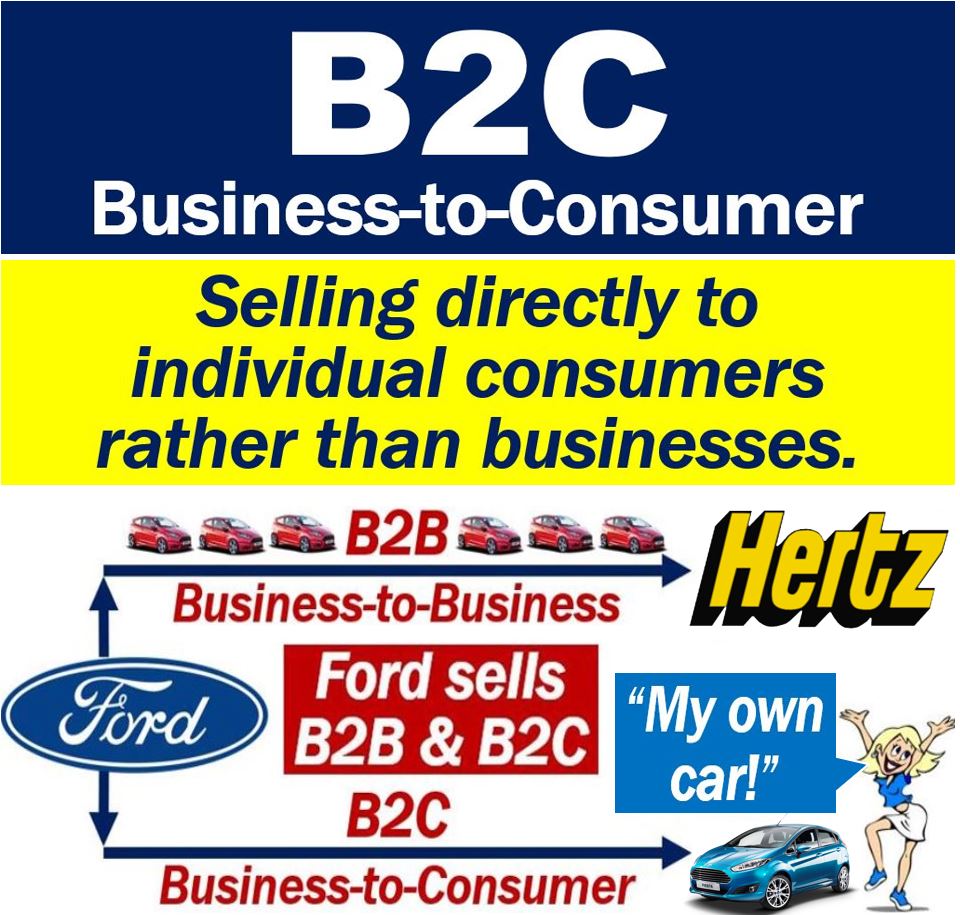B2C, which stands for Business-to-Consumer, means commerce between a business and individual consumers. It refers to the exchange of products or services from businesses to end-consumers, i.e., retailing. We once used this term to describe commerce between traditional brick-and-mortar retailers and people who walk in. However, today we also use it for online shopping.
When writing, please remember that in its short form – B2C – the number ‘2‘ represents the word ‘to‘ in ‘business-to-consumer.’ The words ‘2‘ and ‘to‘ sound the same. Don’t make the mistake of writing the long form as ‘business-two-consumer.’ It is wrong!

Some companies, like Ford, sell both B2C and B2B, i.e., business-to-consumer and business-to-business. In the image above, Hertz, a multinational car rental company, is a business customer. The woman who just purchased the blue car, on the other hand, is an individual consumer.
B2C vs. B2B model
The business and marketing strategy of a B2C model is significantly different from that of a B2B model. B2B stands for business-to-business.
The marketing process is also different. When trying to attract consumers, companies have to add, for example, emotional factors to their strategy. This is much less the case when selling to businesses.
The decision-making process of a consumer is much simpler compared to a company. In other words, companies take much longer than individuals to come to a purchasing decision.
A department manager, for example, may need to get the OK from the legal department to purchase something. Also, if it is a large order, perhaps one of the directors must sign.
Old and modern B2C models
Traditionally, a B2C model referred to the exchange of goods and services at shopping malls, supermarkets, restaurants, etc. Today, however, the meaning also includes online shopping.
McDonald’s
One example of a 100% traditional business-to-consumer model is McDonald’s. The fast-food giant has its products available for customers only at physical places, i.e., you cannot buy its meals online.
Amazon
Amazon, on the other hand, is an example of a 100% e-commerce B2C model. E-commerce means doing business online.
The online giant works as an intermediary. It offers all kinds of products from different places at any time to anybody with access to the internet.
Six different business models
Business-to-consumer is one of six e-commerce models. They are:
- B2C (business-to-consumer)
- B2B (business-to-business).
- C2C (consumer-to-consumer).
- G2B (government-to-business).
- B2G (business-to-government). Many defense contracts, for example, are B2G.
- G2C (government-to-consumer).
B2C online business models
There are five common types of B2C online business models. Below is a brief description of them.
Direct sellers: This is a very popular model. Companies offer a wide variety of goods and services to people online.
Intermediaries: Intermediaries don’t offer anything of their own. Instead, they offer their platform to users so that they can buy or sell products.
Online communities: Offer an open space for companies to advertise their brand or products to platform users.
Advertising-based: Advertising features to attract specifically end-consumers in large volumes.
Fee-based: Companies offer their services, products, or benefits to people in exchange for a fee.
Video explanation
This educational video explains what ‘Business-to-Consumer (B2C)’ is using easy-to-understand language and examples.
